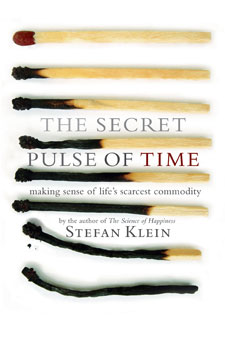On July 16, 1962, a Frenchman Michael Siffre descended into a cave with a diary, but without a wristwatch. He wanted to find out what happened if he were deprived of a sense of time, for weeks on end. When he emerged on September 14, Siffre thought the date was only August 20. For Siffre, 25 days of his life seemed to have simply vanished.
Siffre's personal body clock, it turned out, ran slow. It kept a regular day of 24 and a half hours. Out in the sunlit world, he would have retired to bed late most nights, and awoken tired. In the darkness of the cave, however, his body clock was not so restrained.
 It turns out that our body's sense of time is determined by our genes. Some folk run "on time" " these are the "morning people" who muse incessantly about how beautiful birdsong is at dawn, or what a great time of the day 4am is for really getting things done.
It turns out that our body's sense of time is determined by our genes. Some folk run "on time" " these are the "morning people" who muse incessantly about how beautiful birdsong is at dawn, or what a great time of the day 4am is for really getting things done.
Others may be "out of sync" with the sun by as much as two hours a day. It makes no more sense, Stefan Klein points outs, to upbraid a "night owl" for not looking chirpy at breakfast, than it would to reprimand him for being brown-eyed.
This is just one of the many fascinating insights of this book by a leading German science journalist about what Benjamin Franklin called "the stuff life is made of" " time.
Why does time fly when we are having fun? Why do the hands on the clock scarcely seem to move when we are not? Why do the years fly by faster, the older we get? Klein attempts to answer these and many other questions by reference to psychological case studies (think Oliver Sacks) and the latest scientific research.
In spite of a plethora of labour saving devices, and more "leisure" than our ancestors knew, many of us never seem to have any spare time: so much to do and so little time to do it. The hectic pace of each day seems to deprive us of joy in life, by sapping our capacity to concentrate on anything for more than a few moments.
Multi-tasking, it turns out, is a villain, not a friend: we need to learn afresh how to give our whole attention to a single task, if we are to improve our prospects of completing it promptly and well.
It's easy to apply Klein's diagnosis to our Christian lives. Do you have trouble concentrating in prayer or Bible-reading? Maybe your habit of simultaneously reading emails, texting on your mobile, and keeping your ear in a conversation could be to blame.
We in the West may have a particular predilection for dwelling in contemplation of the past or in anticipation of the future, rather than simply appreciating and enjoying the present.
If this sounds familiar to you, then Klein has some helpful suggestions. Find time each week to do nothing or even one thing only: read a book without distraction; listen to music purposefully (rather than in the background). Turn off the ipod once in a while, look up and listen and sense what and who are about you.
If you are a late riser, then stop fighting it: start living in harmony with your chronological destiny and sleep in!
The benefits could be substantial. Because adolescents are especially averse to waking up, some American school districts have put the commencement of the school day back an hour, and achieved meaningful academic gains.
To enjoy the time of your life " while it is happening " this is wise counsel for the Christian and it's consistent with the Bible's teaching.
For it was upon pondering the repetitiveness of life and the futility of seeking satisfaction in money that the teacher "realised that it is good and proper for a man to eat and drink, and to find satisfaction in his toilsome labour under the sun during the few days of life God has given him" He seldom reflects on the days of his life, because God keeps him occupied with gladness of heart" (Eccl. 5:18-20).























